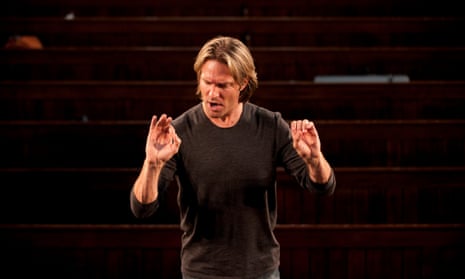Most of us have known this for years, but it seems that research by the Royal College of Music’s Centre for Performance Science finally proves that “listening to and performing music has been shown to have a positive, biological effect on mood and stress levels”. Evidence came from a survey of saliva samples, readings from ECG monitors (to which 15 singers and 49 audience members with various degrees of musical experience were voluntarily strapped), and the results from a questionnaire. The concert that produced this research? Eric Whitacre’s choral music at the Union Chapel in London in March.
It is, of course, important that there’s some hard science to back up the claim that apologists for music, and classical music in particular, routinely make about the links between musical participation and wellbeing. As Aaron Williamon, who runs the RCM’s Centre for Performance Science says, the research reveals “significant psychobiological effects, and the implications are hugely exciting, particularly when taking into account previous research, which links reduction in stress hormone activity with increases in immune function”. And it’s important to add that this latest rigorously scientific work comes on the back of generations of in-the-field experiential data that music therapists and health workers have been creating and collating for decades. Music doesn’t just have the potential to make you feel better, it can really improve mind, body and spirit.
Which is all marvellous, of course. But I have real doubts about the ways that research like this might be used in the future. Yes, musical performance, whether you’re a singer, a player or a listener, has the potential to be a good thing to do, and to make you feel terrific about the world and everything in it. But it also has the potential to be a powerful stress inducer.
Williamon and his team at the RCM know that too, and work with students at the college on strategies to reduce performance anxiety and other conditions associated with the strain of going out on stage, which can lead to chronic problems with self-medication of one kind or another in what is supposedly the stress-free panacea of playing music for a living. For many, it’s the exact opposite, and even this latest research acknowledges that potential, saying that while “singing in a low-stress rehearsal reduced levels of stress hormones (cortisol and cortisone) and didn’t affect psychological anxiety … singing in a high-stress concert increased stress hormone levels and psychological anxiety.”
There’s another dimension, too. Insisting on the stress-reducing effects of music, especially the soft-focused choral works of a composer such as Whitacre, is one thing. But music has more than that to offer. If reducing stress was the primary driver of musical expression over the centuries, musical culture would not have developed very far or become as meaningful as it is.
The levels of emotional intensity and intellectual stimulation produced by everything from Monteverdi to Mozart, Beethoven to Bruckner, Stockhausen to Xenakis, all create a kind of transcendence that comes from going to places of expressive extremity – and sometimes darkness and desperation - that would otherwise be dangerous to confront directly. In other words, it’s music that puts you through a stressful experience. It’s a positive stress perhaps, but it’s stress nonetheless, which comes with concomitant physical symptoms – shortness of breath, mysterious tingles when a piece touches you deeply - and everything else that comes with throwing yourself onto the dramatic rollercoaster of an astonishing piece. (And that’s just to touch on classical repertoires: you could say the same – and much more! – about the performative and listening experiences of everything from heavy metal to white-noise electronica, free jazz to deep house.)
The music that matters the most to us – well, to me at any rate – makes me stressed, in a deep sense, because it confronts and disturbs our emotional equilibrium. It offers consolation, too, but that’s only one dimension of musical possibility.
The RCM’s research is important in backing up the hunch that many of us will have always had about how music can make you feel better in some circumstances. But that’s not the main reason it matters, and it shouldn’t become a central plank of the ongoing arguments around its cultural importance and value.
Music as palliative be damned: let’s hear it for stress!
- The RCM’s study will be replicated at a concert of music by Eric Whitacre at the Cheltenham Festival on 7 July, before discussing the findings of both studies in a public talk – Is Singing Good for You? – on 11 July.

Comments (…)
Sign in or create your Guardian account to join the discussion